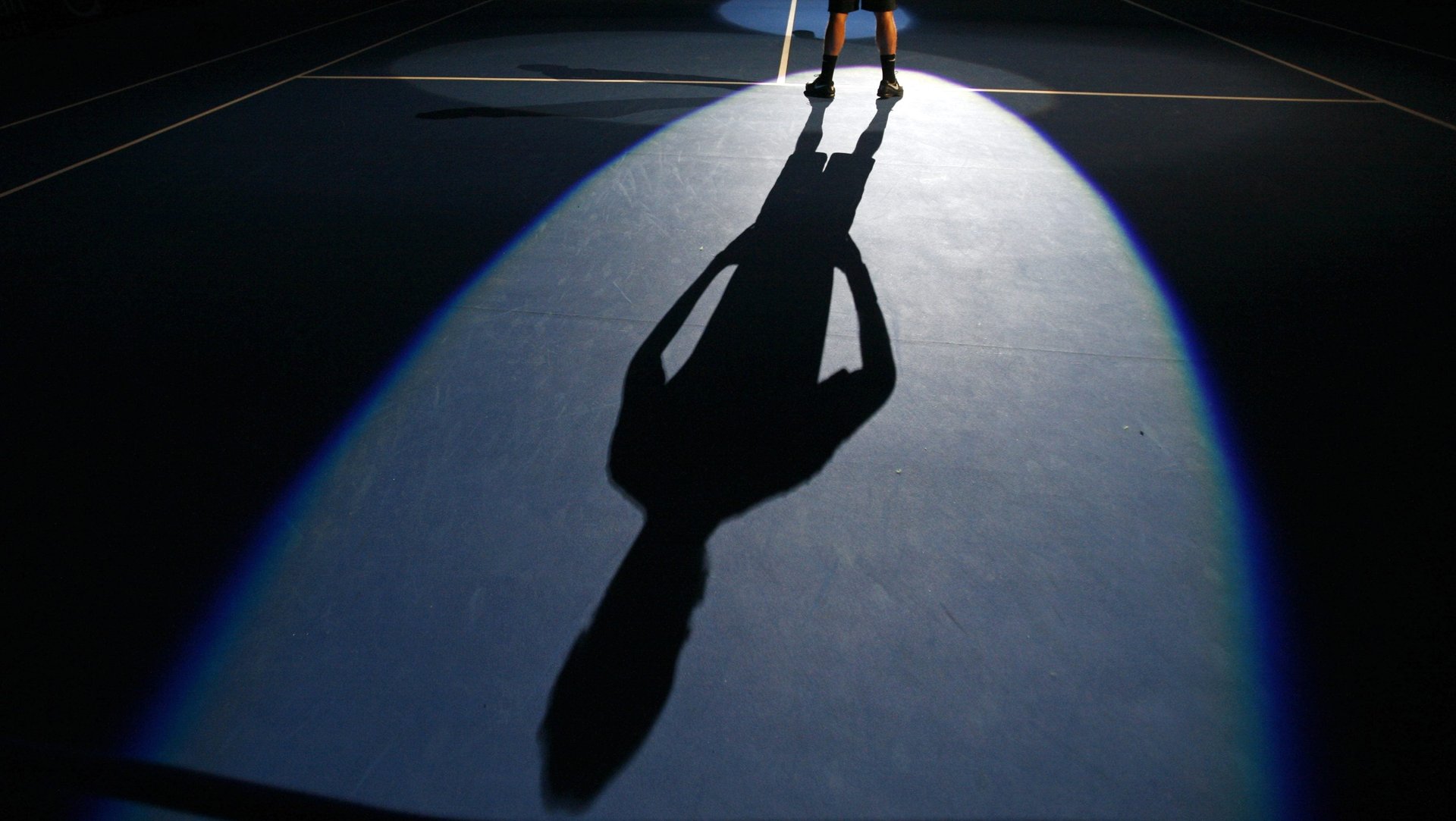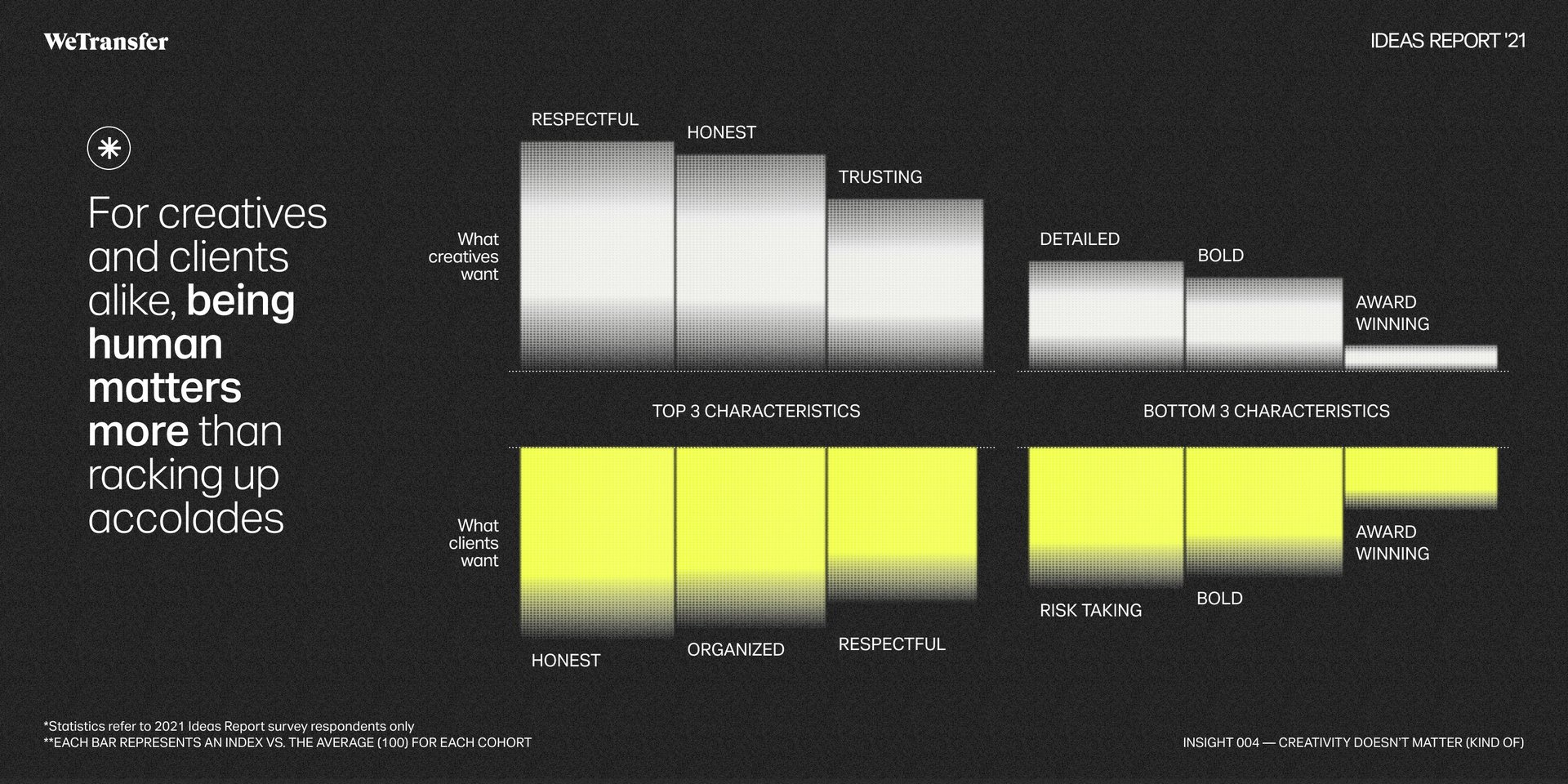Creative types say it’s better to be nice than brilliant. Here’s why.
The reign of the creative genius may finally be coming to an end.


The reign of the creative genius may finally be coming to an end.
A new report published by WeTransfer, the Dutch B Corps best known for its delightfully simple file-sharing service, suggests that when it comes to choosing partners, creative professionals value “open, honest communication, and respect” far more than the likelihood they’ll produce award-winning work. It wasn’t always that way.
For its fourth Ideas Report, released Nov. 3, WeTransfer surveyed over 10,000 people from 153 countries in the so-called creative sector including designers, filmmakers, musicians, photographers, tech workers, public relations professionals, and marketing specialists to get a sense of what matters in the global creative industry.
This year’s report offers compelling evidence that power has become more distributed, marking a shift from top-down personality driven approaches to flatter, more team-based approaches, where the process is as important as the end result.
It’s all about teamwork
In a way, WeTransfer’s findings aren’t so surprising.
The model of the lone creative genius at the top has eroded in recent years. In 2017 for example, the Pritzker Prize broke from the tradition of giving the architecture industry’s highest honor to one individual and honored RCR Arquitectes, a trio of architects from Spain. And in the last decade, TIME magazine selected groups over individuals five times for its “person of the year” pick. Last year’s accolade was shared by US president Joe Biden and vice president Kamala Harris.

The big thing about teamwork, of course, is that fostering good relationships becomes paramount. “It’s not that originality and creativity don’t matter,” WeTransfer’s researchers emphasize. It’s that communication becomes the real issue.
“The report underscores the clamor from clients and creative professionals to shed the egos, and “present ideas in ways that make sense for everyone.” To their point, several studies have shown that diverse teams produce more creative solutions.
The awkwardness of conducting virtual presentations and meetings during the covid-19 pandemic has also put a higher premium on really good communication. Nearly 30% of clients say they feel less connected to their collaborators over the course of the pandemic so the way an idea is introduced is almost as important as the idea itself.
The report also indicates that clients seek creative partners who are organized; and creative types say trust is a basic premise for good collaborations. Being “bold” or “risk-taking” were ranked among the least important traits within the industry.
Industry awards take a backseat
The renewed focus on teamwork over individuals has another unexpected outcome: Less focus on winning awards, and more focus on the work itself.
Entering industry competitions has been a known strategy for up-and-coming and established studios to self-promote. But that norm is fast changing, WeTransfer’s survey suggests.
While a conference room chock full of trophies and prizes was critical for credibility before, now over one-third of respondents ranked shares on social media or being featured in a magazine as more important. This compares with just 15% who still ranked awards as most important.
Hamish Smyth, co-founder of the Brooklyn-based design studio Order, has witnessed this evolution. As an intern in the early aughts, Smyth recalls spending days preparing award show entries, when winning had a more direct effect on a studio’s success. Before social media, design annuals—printed books featuring award-winning entries—were the primary resource for learning about trends and new talent across the global creative industry.
But when Smyth and his business partner Jesse Reed opened their own studio in 2017, they resolved never to enter design competitions. “We felt that awards have fallen out of fashion,” he tells Quartz. “I see that they once had a purpose, but the internet killed the need for them.”
“I think now it has become a racket for some companies [who give out awards],” Smyth observes. “The real vampires are the ones that waive contest fees but ask winners to pay a fee to receive their prize and a mention in the awards book.”
Instead of trying to accumulate accolades to hang on their walls, Smyth and Reed resolved to earn their clients’ trust by working harder on projects. “We thought: What if we invested that time in doing a better job for our clients and theoretically creating better work,” he says.
Allison Connell, design director of the branding agency Athletics says having too many awards these days can even be a bad thing. “When I was starting out, awards were the best way for me to research studios,” Connell explains. “Now, I feel like I know too much and am skeptical of studios that spend too much time applying to awards.”
Damian Bradfield, WeTransfer’s chief creative officer, believes that validation has shifted from coteries of award show judges to the internet—where hearts, likes, re-shares, and retweets can be meaningful. Bradfield, a 20-year veteran of the advertising industry, tells Quartz that he welcomes this change.
“Those of us who define ourselves as creatives or work in creative industries are complicated beasts, plagued by insecurity, arrogance, self doubt, brilliance, and indifference,” he wrote in the Ideas Report. “We’re rejecting the awards industry. We’re hearing from new voices. We’re doing away with egos. Will no one turn up to the Emmys next year? Will Cannes be a ghost town in June? I don’t want to give it all away, but there are some learnings in this year’s report that should make us all think.”